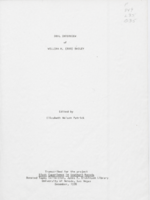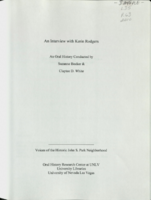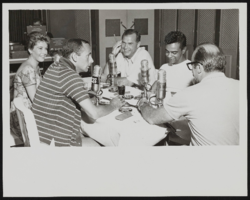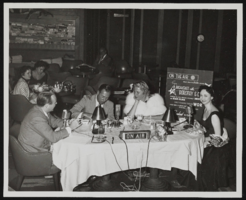Search the Special Collections and Archives Portal
Search Results

Transcript of interview with William H. Bailey by Betty Rosenthal, March 16, 1978
Date
Archival Collection
Description
Interview with William H. Bailey conducted by Betty Rosenthal on March 16, 1978. Arriving in Las Vegas in 1955, Bailey became an assistant producer and master of ceremonies in the first interracial hotel in Nevada, the Moulin Rouge, and subsequently worked in radio and television. Bailey reflects on the history of discrimination in Las Vegas and its impact on the entertainment industry. Bailey's wife Anna was the first black girl dancer on the Strip in the 1961 production, "Nymphs of the Nile." Appointed by Governor Grant Sawyer to the Nevada State Equal Rights Investigatory Commission in 1961, Bailey served as its chairman and traveled throughout the state holding hearings. He describes his work on the commission and how discrimination in housing personally affected him.
Text

Edited narrative of interview with Audrey "June" Taylor Henry by Claytee D. White, February 26, 2010
Date
Archival Collection
Description
Edited narrative of an interview with Audrey "June" Taylor Henry conducted by Claytee D. White on February 26, 2010. Henry was a dancer, choreographer, broadcaster and Las Vegas resident since 1992.
Text

Transcript of interview with Kerin Scianna Rodgers by Suzanne Becker and Claytee D. White, February 7, 2009 and August 11 & 16, 2011
Date
Archival Collection
Description
Kerin Rodgers was born in 1936. She recounts her family history and stories of her youth growing up in Boston, MA, and shares how the family relocated to Seattle, WA in the mid-1940s. She talks about her enjoyment of theatrical arts and politics, and about being a resourceful divorced, single-mom and entrepreneur. In 1958 she opened a retail fashion store and modeling agency with a friend in Santa Monica, CA. Kerin had a knack for fashion and interior design that would assist her then and into the future. She also shares the story of arriving in Las Vegas as part of retail job with The Broadway stores in 1966—a two-week stint that seemed to have no ending. Her transition into Las Vegas included remarriage, a 1974 Keno win that enabled her to put down money on a home ( a house built by Paul Huffey) in the John S. Park neighborhood, and making close friends in the community. Her interview is sprinkled with tales of activities and personalities from the neighborhood's past and present. Kerin was involved with the Focus Youth House, speaks about First Fridays and art, as well as gives a perspective of police, criminal behaviors and changes in the neighborhood over the years. She hosted a local television show and enjoyed being a community activist.
Text

Mitch Miller radio program: photographs
Date
Archival Collection
Description
Series XVIII. Television, Radio Shows, and Movies
Mixed Content

Breakfast with Dorothy and Dick radio broadcast at the Sands Hotel: photographs and correspondence
Date
Archival Collection
Description
Series XVIII. Television, Radio Shows, and Movies
Sands Hotel and Casino
Mixed Content

Chet Buchanan oral history interview: transcript
Date
Archival Collection
Description
Oral history interview with Chet Buchanan conducted by Barbara Tabach on November 28, 2017 for the Remembering 1 October Oral History Project. Chet Buchanan begins this interview with a discussion of his move to Las Vegas, Nevada in 1999 after he was offered a job as a radio show host for 98.5 KLUC. He talks about the specifics of his job, including his career background as well as the Chet Buchanan Toy Drive. For this interview, he specifically goes into detail on his coverage of the Las Vegas October 2017 mass shooting and discusses being in San Diego, California at the time, yet still striving to reach people through his broadcast with the help of CBS San Diego. Throughout the interview, Buchanan examines his desire to make a difference in the community with his show and his interactions with the public.
Text

Alan Stock oral history interview: transcript
Date
Archival Collection
Description
Oral history interview with Alan Stock conducted by Barbara Tabach on December 27, 2017 for the Remembering 1 October Oral History Project. In this interview, Alan Stock discusses moving to Las Vegas, Nevada in 1999 for his job as a radio talk show host for KXNT. Stock describes the broadcast that covered the October 1, 2017 Las Vegas mass shooting from 11 PM on that night until 9 AM the next morning. He talks about some of the calls the station received from various members of the community, including survivors of the shooting, families of those at the event, people on lockdown in the nearby hotels, doctors, and general listeners. Stock describes some of the topics discussed on the broadcast, such as what was currently happening on the Las Vegas Strip, stories of the aftermath, and the support needed from the general public. Other topics include gun control and conspiracy theories. He discusses the impact this and other shootings would have on public affairs, including tighter security in daily living and public gatherings. He compares security in the United States to security in Israel and other countries, focusing on the idea of unconcealed guns worn in public. Throughout this interview, Alan Stock explains that the radio station's goal was to provide accurate information to the public during the aftermath of the October 1, 2017 mass shooting.
Text
